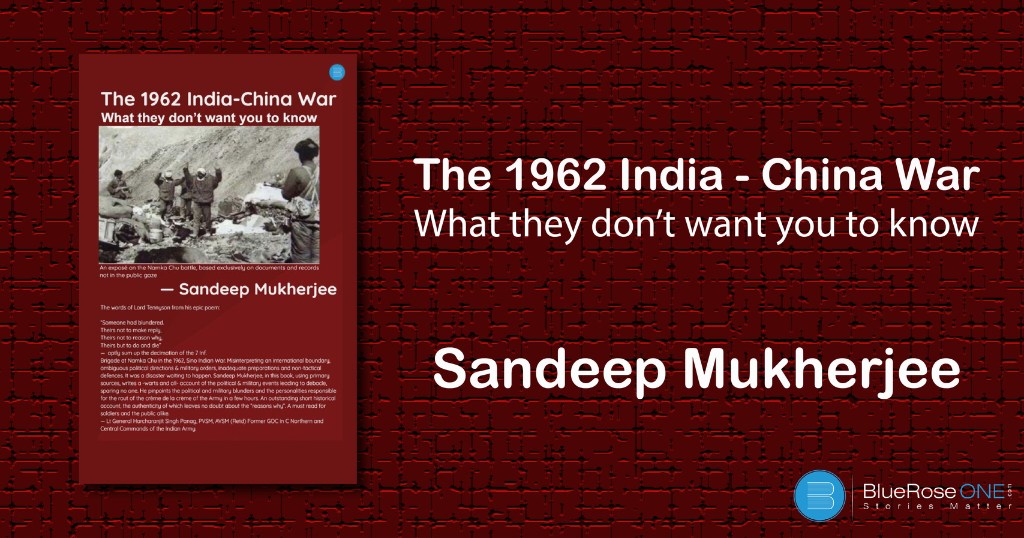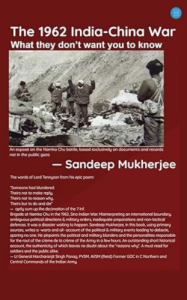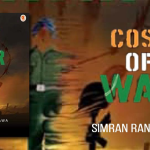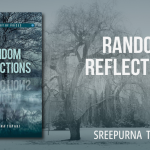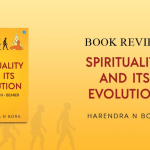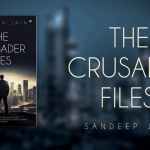Book – The 1962 India-China War: What They Don’t Want You to Know
Author – Sandeep Mukherjee
Blurb – For decades, the real facts about India’s catastrophic defeat in the 1962 war with China have remained shrouded in mystery. Innuendoes, emotional tirades, politicised accusations, personalised mud slinging, and rumours have substituted cold, hard, and documented facts. This book seeks to address this major gap in Indian military history, trace the accountabilities for this monumental failure, and plead for historical justice for those wronged. The author presents facts from long suppressed inquiry commission reports, official history, Chinese sources, and documented studies by international scholars. The professional background and qualifications of the major dramatis personae have been analysed, their recorded decisions scanned, and relevant actions revealed.
The relevant portions that have been referred to, from published memoirs of the key players, have either remained undisputed over decades or corroboration from other authentic sources has been provided. Hearsay and unsubstantiated anecdotes have been left out as far as possible, with recorded evidence provided with each proposition and inference. Satellite imagery has been extensively used to give readers a comprehensive feel of the battle area and the surrounding locale. All relevant features and important locations have been plotted on these images. An honest endeavour has been made to make the readers experience the reality of the battleground, terrain, and conditions by means of thorough detailing and vivid descriptions.
Book Review - "The 1962 India-China War" by Sandeep Mukherjee
Sandeep Mukherjee’s book, “The 1962 India-China War: What They Don’t Want You to Know,” serves as a groundbreaking exploration into the often obscured and controversial facets of India’s historical defeat in the 1962 war with China. Mukherjee, armed with meticulous research, confronts the myths and speculations surrounding this catastrophic event, delving into suppressed inquiry commission reports, official histories, Chinese sources, and studies by international scholars.
For decades, the narrative surrounding the 1962 war has been clouded by emotional rhetoric, political finger-pointing, and unverified anecdotes. Mukherjee courageously navigates through this fog, relying on factual evidence from declassified reports and the memoirs of key players. The book seeks to restore historical justice by presenting an unvarnished account of the events leading to India’s defeat.
One of the book’s strengths lies in its thorough analysis of the professional backgrounds and qualifications of key military figures involved in the conflict. Mukherjee dissects their decisions, offering readers a glimpse into the decision-making processes that contributed to the failure. Maj. General M.P.S. Kandal, who commanded the Dokala Brigade, praises the book’s comprehensive approach, urging institutions like ARTRAC and the War College to dissect why a professional army with experienced leaders failed in preparedness.
A significant aspect of Mukherjee’s narrative revolves around differing perceptions of the McMahon Line and the Forward Policy. The book sheds light on controversies such as political interference, command paralysis, and the alleged betrayal of Major MS. Chaudhary and his men of 9 Punjab at TsengJong. This exploration is particularly insightful, offering readers a nuanced understanding of the complexities that contributed to the conflict.
Read: A Complete 2024 Guide: How to Write a Book & Get it Published Globally.
Mukherjee brings attention to the injustice surrounding the suppression of critical information, notably the inputs from Capt. Mahavir Prasad on the conflict zone. The book serves as a call for rectifying historical oversights, urging scrutiny by military organisations to draw valuable lessons for the future. Maj. General Sudhakar Jee, who commanded the Tawang Brigade, recommends a thorough analysis of Mukherjee’s work for its veracity and lessons.
Brigadier Indrajeet Gakhal emphasises the book’s role in shattering myths and putting events in their correct perspective. Drawing on the Henderson Brooks Report and various books on the debacle, Mukherjee presents fresh insights that illuminate previously unclear facts. The narrative seeks to salvage the reputation of the Indian soldier while holding inept leadership accountable.
A central theme in the book is the clash between military logic and political orders. Mukherjee underscores the importance of reasoned military decision-making, urging military leaders to avoid blindly executing political directives. This message resonates as the Sino-Indian War of 1962 serves as a cautionary tale of the consequences of unpreparedness and political interference in military affairs.
Read: Complete Guide on How to Write and Publish a Book Online – 2024 Guide
The 1962 India-China War: What They Don’t Want You to Know” is a remarkable contribution to the understanding of a pivotal moment in Indian military history. Sandeep Mukherjee’s exhaustive research, reliance on credible sources, and commitment to presenting an unbiased narrative make this book a compelling read.
It not only unveils the hidden truths of the 1962 war but also prompts reflection on the intersection of military strategy, political decisions, and the imperative of learning from historical mistakes. Military leaders, historians, and anyone interested in the intricacies of this conflict will find Mukherjee’s work enlightening and thought-provoking.
Publish your book with BlueRoseONE and become a bestselling author. Don’t let your dream of becoming an author fade away, grab the opportunity now and publish your book – be it fiction, non fiction, poetry or more.
You may also like: The Rise of Self-Publishing: Empowering Authors

